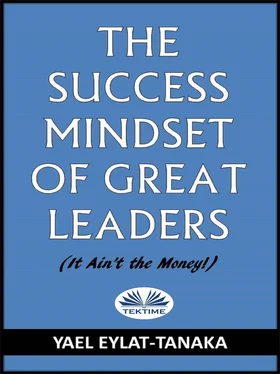I wrote this book to impart my feeling that success is much more than money and riches. Real wealth is life itself - health, friendships, family ties, connections, serenity. They elevate the human spirit and embody qualities of gratitude for every aspect of life. Anyone who has weathered adversity and survived unscathed, nay, better for having endured it, is said to be wealthy beyond avarice. That is success.
We all possess within ourselves the makings of greatness. This is not some airy-fairy proclamation, another affirmation to recite while twisted in an arcane yoga posture. It is more than positive thinking. It is an immutable truth: Human beings have the capacity to reach enormous heights as ambassadors and facilitators of progress, technology and the betterment of mankind. To be sure, there are many impediments to the achievement of greatness, yet one of the most insidious can be understood by a single principle: a bad attitude, a blindness to the riches of life; the inability to acknowledge or recognize success as representing all of life, the difficulties as well as the triumphs.
The antidote is a paradigm shift.
Chapter 1
Paradigm Shift
What Success Is – And Isn’t
Success is one of those fluid words that has become a catch-all in our modern lexicon to denote anything from a sought-after promotion to being drafted by one’s favorite football team. The meaning most frequently attached to the word is a measure of financial windfall that would spell the realization of all of one’s dreams. Wealth and prestige symbolize success, perhaps because of the impression that if one has accomplished a great feat, his or her financial wherewithal should represent that accomplishment. After all, what would be the point of creating great art or struggling to climb the corporate ladder if financial rewards were not part of the end game?
I believe that the concept of success must be reassessed. Was van Gogh a success? Not by today’s standards. He struggled to sell his paintings, was depressed and erratic in behavior and died a poor man. Yet his work is displayed and admired in some of the most prestigious museums of the world, and his paintings fetch incredible sums at auction. What about former President Jimmy Carter. Could he be labeled a success? He was the leader of the free world for a shining moment, then retired to a mundane life of philanthropy by building homes for the poor and disenfranchised.
Hollywood celebrities, Wall Street moguls, even many politicians might grace the pages of prestigious magazines because of their influence on culture, their financial acumen, or their business savoir faire. They represent a form of success that we have come to revere, admire and strive for. As a society, we have been indoctrinated in the precepts of materialism and accomplishment as the symbols of a life well lived. Wealth itself seems to be code for success.
We adore celebrities. We put them on a pedestal, deservedly or not. Their only claim to fame might be a film that grossed millions of dollars or scoring the greatest number of home runs. Indeed, we are downright surprised when one of these luminaries is caught red handed in a scheme, or worse, a crime.
I am reminded of a celebrity in the field of golf, Tiger Woods. Handsome, accomplished, talented, with a stunningly beautiful wife and adorable children. He engaged in some unsavory extracurricular activity, and as would be expected, his wife divorced him amid a public and shameful scandal, many of his sponsors canceled their contracts with him, and he lost a significant portion of his previous fortune. Worse, his popularity suffered gravely, and I can only imagine that his self-esteem fared no better.
Professional ball players can command obscene salaries, are adulated by the star-struck masses and held up as paragons of success. They are interviewed by prominent journalists, appear on the covers of eminent magazines, are rewarded by sponsors with marketing deals that further promote them and use their image as emblematic of the product they are promoting, thus subliminally associating their perceived success with the product they represent. We rarely pause and reflect on their character. If one of these celebrities should appear in the news for having committed a faux pas, much less an outright crime, the media rallies to cover the events surrounding the act, analyzing possible motives, debating whether a public apology would be effective, and otherwise covering the perpetrator and his or her peccadillos ad nauseam. Recall the months-long television coverage of the double-murder trial of O.J. Simpson. What was it about him that deserved so much scrutiny? Why was the public so enamored of every lurid detail of his murder trial? Yes, he was once a famous football player, and had parlayed his fame to sports casting as television commentator, as well as appearing in some forgettable movies. Is that what we hold up as success?
It seems that the mere attainment of some measure of fame – or perhaps notoriety – pushes us to seek juicy tidbits of that person’s life. The pages of gossip magazines are filled with stories about fatuous Hollywood or Wall Street bigwigs, and every detail of their lives is splashed in the media for all to drool over. And as a society, we oblige. The tabloid headlines exist precisely because the public demands them.
These celebrities are far from unique in taking liberties with their personal values. It seems that fame and wealth, adoring fans, prestige and adulation are tickets to a decaying sense of right and wrong. If that is true, the obvious question becomes why? What is the connection between the accumulation of goods and glory and the relinquishment of basic principles? Is this the price we pay for the trappings of what we have come to associate with success?
The reason we worship celebrities is that we wish to vicariously enjoy some of their success – or what we believe is success. If we buy that gorgeous dress we saw on Angelina Jolie, or if we buy that Cadillac, then we, too, will be sexy and glamorous, and some of Matthew McConaughey’s mystique might rub off on us. We too will feel desirable and popular. If we use that aftershave or drink that brand beer, we too will swim in the pool of allure and prestige. We can imagine hearing cool jazz wafting through the walls as we fantasize ourselves strolling into an elegant room dressed in a tuxedo, all eyes upon us, the women clamoring for a mere sideways glance in our direction.
Is that success? Are we so deficient in self-esteem that we must lap after specters?
We must reappraise the people or causes we admire as our heroes. We must ask ourselves whether they are worthy of the celebrity we accord them. We fall heads over heels for the subliminal messages of advertising, while rarely examining the inner lives or motives of the objects of our adoration, or indeed, our own; whatever contributions we make – good and bad – to our own lives and the lives of others.
The “Me” generation has not disappeared into the limelight, supplanted by a less self-centered, more magnanimous generation. The “Me” generation has simply morphed into Gen Y, Gen X or Millennials - a breed that remains on the continuum of following what feels good, what is expedient right now, ever focused on the inner mantra of “what’s in it for me.”
How can we move from a selfish, self-centered attitude of consumption to one that is more holistic and healthy? Indeed, is there anything with the spirit and desire to accumulate? The answers may not be self-evident.
Humans evolved to live in groups, and that implies a considerable measure of cooperation among members. Looking out for Number One and conspicuous consumption are unhealthy elements of our present-day society as these attitudes do not promote cohesiveness of the group. In fact, quite the contrary: They promote divisiveness and competition. These attitudes imply scarcity: If you are eating a lavish meal, there will not be enough for me.
Читать дальше












